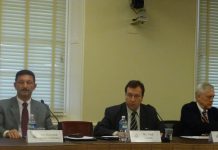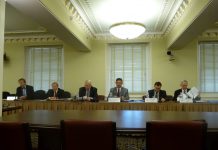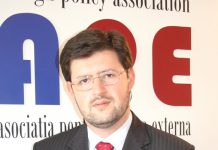APE staff
Statement by Vlad Lupan, Independent Expert from Moldova at the briefing held by the...
Thank you for the possibility to share my views about the democracy in Moldova, as well as for the concern that the Commission shows for my country. I hope this extremely encouraging attitude continues and the Commission will organize a hearing on Moldovan matters ahead of 2009 elections. I would also like to thank the Moldova Foundation based in Washington for assisting me in attending this session. I do not intend to speak about the comparative successes of the current Government versus existing problems, as the Government has the opportunity to promote its point of view extensively through the existing network of official visits and meetings. The civil society has fewer possibilities. Therefore I will go to the point and focus mainly on those concrete shortcomings that present a serious concern for democracy in Moldova.
Statement by Nicolae Chirtoaca, Ambassador of Moldova to the United States at the briefing...
It is an honor and a privilege to appear before you today to discuss the issues related to democracy development in my country the Republic of Moldova fro mthe perspective of approaching 2009 parliamentary elections and taking into consideration the changing geopolitical environment in the East of Europe caused by the recent Georgia crisis that has a direct impact on the settlement of the so called "frozen conflcts" in the ex-Soviet space.
The EU should re-engage with Moldova’s ‘frozen conflict’. Nicu Popescu. EUObserver
Recently, the EU has learned that a war over an obscure place such as South Ossetia can shatter the arrangements of post-Cold War Europe. The armed conflict between Russia and Georgia has reverberated even more shockingly across the post-Soviet space. Without stronger engagement with its neighbours, the EU might end up with a bi-polar Europe, not a "ring of friends" in its neighbourhood.
The Position of a Group of Experts Regarding the Impact of the Georgian Crisis...
The armed conflict between Russia and Georgia has produced a major political-military crisis capable of generating profound transformations in the system of international relations. Rapid and fundamental degradation of institutional cooperation mechanisms and relations between Russia, on the one part, and the European Union and NATO, on the other, marks the beginning of a new period of confrontation, with serious implications for regional security and stability. The Georgian crisis threatens stability of many post-Soviet countries that Russia unilaterally perceives as being part of its paramount sphere of interests. These countries face separatist conflicts that have been initiated and supported politically, economically and militarily by the Russian Federation. The armed conflict between Georgia and Russia has clearly demonstrated the role of Russia as a party in these conflicts and highlighted the limitations of the existing system for ensuring stability in the frozen conflict zones.
Analysis: Moldova Pushes For Transdniester Settlement. Andrei Popov. Radio Free Europe/Radio Liberty. www.rferl.org.
Representatives of all parties involved in the Transdniester settlement process gathered in Moldova for informal discussions on July 21-23. First, the 3+2 format și the Organization for Security and Cooperation in Europe (OSCE), Russia, and Ukraine, as mediators, and the European Union and the United States, as observers -- held separate meetings with Moldovan President Vladimir Voronin and Transdniester "vice president" Aleksandr Korolyov. The region's de facto president, Igor Smirnov, demonstratively chose not to attend.Then the same group participated in a meeting of the heads of joint expert groups for socioeconomic issues set up between Chisinau and Tiraspol. Finally, informal consultations were held within the complete 5+2 format, including the Moldovan and Transdniester chief negotiators focusing exclusively on proposals for advancing confidence-building measures between the two sides.
Speech by U.S. Charge d’Affaires on July 4, 2008
Perhaps, these commonalities explain the affinity between the United States and Moldova, and provide a basis for Americas continued interest in the future of Moldova. Perhaps, they explain why Americans, both through our government and as private citizens, maintain partnerships and friendships with the Moldovan people and support your progress along the path of democratic development.
NATO Summit Sends Ambiguous Message on Russian Troops in Moldova and Georgia. Vladimir Socor....
Under Parallel Actions, NATO would accept a promise of Russian troop withdrawal from Moldova in lieu of actual withdrawal. It only speaks of withdrawal of ammunition (not troops) when possible,” without a time-table and implying through that wording that the withdrawal might be conditional (although the 1999 documents had eliminated any conditionality). The proposal allows Russia to retain peacekeeping” troops in Moldova as part of an internationalized operation; but Russia can be expected to stonewall any such internationalization, undoubtedly cite the lack of agreement on it as an excuse for keeping its troops in Moldova.
Moldovan President about Visa Regime with the EU: Between Wishful Thinking and Irresponsible Politics....
August 6, 2007 (Info-prim.md)By Andrei Popov,Executive Director, Foreign Policy Associationof Moldova (APE)At a press conference on July 25th President Vladimir Voronin spoke in ratheroptimistic...
Moldovas Uncertain Future, Europe Report N°175
To access full text of this report please click hereEXECUTIVE SUMMARY AND RECCOMENDATIONSWith Romanias expected entry into the European Union in 2007, the EU...
Moldova: Regional Tensions over Transdniestria. Report Nº157
To access full text ofthis report please click here.EXECUTIVE SUMMARY AND RECOMMENDATIONSResolving the Trandniestrian secessionist dispute in Moldova is vital to remove a potential...






